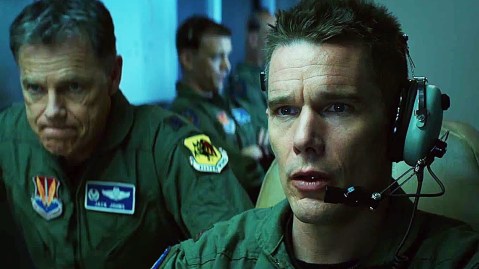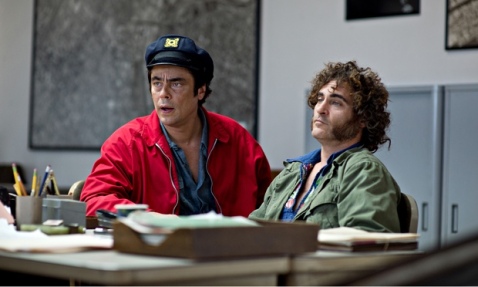Review: Mistress America
Year: 2015
Certificate: 15
Director: Noah Baumbach
Screenwriter: Noah Baumbach and Greta Gerwig
Cast: Greta Gerwig, Lola Kirke, Matthew Shear, Jasmine Cephas Jones, Heather Lind, Michael Chernus
The latest feature from the increasingly prolific Noah Baumbach completes a loose trilogy (along with 2012’s Frances Ha and last year’s While We’re Young) focused around themes of friendship, ageing and ambition. Here, eighteen year old Tracy (played with a steely acuity by newcomer Lola Kirke) feels adrift at university in a New York that has not lived up to her expectations. At her mother’s behest she gets in touch with her soon-to-be stepsister Brooke Cardinas and the two quickly form a strong bond.
Moving away from the mumblecore realism of Frances Ha, Baumbach and Gerwig’s second co-written screenplay is at once more slickly delivered and more surreal. The screwball trappings- myopic mystics, impromptu drives to Connecticut and pie-throwing society initiations- are underpinned by an intelligent exploration of the twists and turns of a sudden and intense (albeit platonic) connection. The farce is elegantly played by the cast who succeed in sending up the ridiculousness of collegiate, bohemian and yuppie society, and the machinations of the main players are captured elegantly by Baumbach’s nimble direction. The plot gallops along and the jokes predominantly hit their mark eliciting regular titters as well as the occasional guffaw.
The chemistry between Gerwig and Kirke is electric, the former delivering a characteristically physical performance which gracefully toes the line between grating and endearing; the latter perfectly embodying the dissonance between Tracy’s emotional infatuation with Brooke and her intellectual knowledge of Brooke’s foibles. Brooke is a magnificent creation- the personification of the vacuity and self-serving capriciousness of the millennial generation; her growing desperation hastily papered over by twitterati bluster and blind self-belief. While this may sound fairly monstrous, Gerwig’s talent is to inject enough charm into her to keep her if not always likeable then at least engaging. She may be flawed, but she is also gregarious and cheerful. This is aided by the device of seeing Brooke through Tracy’s eyes. Like the audience, Tracy can sense that Brooke’s haphazardly constructed life may be about to crumble on its loose foundations (the semi-autobiographical short story Tracy bangs out after their first weekend together forms a meta-narrative of the film) but is nevertheless drawn to her.
Mining the same seam as 2014’s While We’re Young, Mistress America provides similarly bittersweet meditations on the passing of time. Brooke’s insistence that despite the twelve year age gap she and Tracy are contemporaries is belied by her melancholy observations on the inverse nature of the relationship between potential and desire as time progresses. Mistress America posits that coming-of-age tales can be told of all generations: Brooke must wrestle with her transition into adulthood proper with the same ferocity as Tracy tries to find her feet in college.
Verdict: 4/5
Quote: ‘Adultery!? You’re eighteen! You should all be touching each other all the time!’
Image credit: facebook.com/MistressAmericaMovie
Good Kill DVD Review
Black Hawke Down
Released : April 10th 2015
Certificate : 15
Director : Andrew Niccol
Cast : Ethan Hawke, January Jones, Zoe Kravitz, Bruce Greenwood
Plot : Combat pilot Thomas Egan (Hawke) has been forced to give up his day of flying in Iraq after six tours, and instead now man’s a drown control panel stationed in Nevada where his family has always lived. When Egan’s unit are placed under the command of the CIA, the morality of the missions becomes more and more questionable, creating friction both inside the unit and for Egan’s home life.

Ethan Hawke, the now four times Academy Award nominated actor and writer knuckles down for a modern day war drama with a twist, a twist that until now had not been greatly investigated by cinema. For the original project he was joined by an old directorial accomplice Andrew Niccol, famous for the writing and directing of Gattaca, a film which was one of the main stepping stones for Hawke propelling him into mainstream cinema. Good Kill also happens to be written also by Niccol, so we could have the start of a enduring director, actor combo. But Good Kill was more of Hawke’s time to shine again, as the supporting cast being fairly unknown as well as Niccol by average movie goer’s, most of the attention for the film is revolving around Hawke’s ability to portray the damaged war veteran who can no longer peruse his passion.
The initial premise of the story was undoubtedly engaging, its a very modern aspect of warfare and studying the effects it has on the morals of war and the effect on soldiers, if nothing else the film is daring in its attempt to tackle new complex issues of modern warfare. The setting of the film is very restricting from a directorial point of view as it is set mostly in one room and all the combat of the film is one a screen itself, and as far as drama building it was made clear that Niccol struggled. As a viewer it never really seemed like Niccol was able to convey the shock and thrill value of the warfare, unable to overcome the issue of the war being seen through a computer screen. The atmosphere created for the first turn of the film while Hawke is at the controls of the drone where too calm, maybe in an attempt to demonstrate the cold hearted nature of the warfare, but neither this effect nor any sense of thrilling danger was really conveyed in the film as far as the war scenes.
Niccol’s writing as well was disappointing as far as the characters who felt purpose built, unrealistic in the way they had been written to serve a certain purpose in the film. The characters this was most apparent in was Bruce Greenwood as the bases captain, his dialogue was stereotypical in the way he was overly sweary when addressing the troops and his manner of disapproval of the quality of the new recruits gave the role a cartoonihs feel. You were reminded of other better film roles of commandos by the performance, which isn’t the fault of Greenwood but rather the recycled dialogue he was forced to wrestle with. Other characters such as the two other members of Hawke’s unit who blindly went along with the commands of the CIA to the point where their attempts to justify their opinions were borderline laughable as they attempted to justify their views with cliché patriotic speeches. There were further aspects that seemed like slightly cliché, such as the fact that the CIA’s role of the ‘bad guy’ was featured by a deep scary voice that came through a phone in the bunker, not an actual character. Because of these aspects which were extremely unoriginal the environment on the army base at least didn’t feel real, nothing surprised you as the film went along at what felt like a slow pace due to the lack of thrills provided by Niccol’s.
The other half of the film rested on the shoulders of Hawke’s performance and the drama provided form his home life. Hawke’s performance may not have been appalling bad, but again it wasn’t good enough to tackle with the script that he had been given, which must have been limited as the character was basically a mute for a large percent of the film, which can prove to be an issue if your the main character. The fact that he was silent mostly and joined with the way that Hawke played him as a cold eyed slow docile man prove for a character which it was difficult to make an emotional connection to, due to a large amount of inactivity. Unfortunately this didn’t make for riveting viewing, and for a film which revolves around a central character this was the main breaking point. On top of this the depiction of his life at home felt rushed, lacking in required depth and investigation, presumable to allow the story to spend more time on base with Hawke flying the drone, but as stated little excitement was found their either. The home environment of the film needed more time and effort, for example the children are never really feature in the film, other than hugging their parents, in the entire film only one scene when Hawke has a scene with multiple lines with one of the children. The effect of this was leaving more of the film to rely on Hawke’s sole performance, which unfortunately wasn’t strong enough to redeem all these poor aspects of the film.
Good Kill unfortunately doesn’t function well as a thriller or as a drama, and for a war film with little action this leaves really little to look at apart from Hawke’s Mustang. The disappointing aspect is that the films premise is good and unexplored until this film, meaning it had the potential free range to introduce us to the knew struggles that the soldiers who fly the drones have to face, but little in the film will provoke an emotional response. The highlight of the film is finally when Hawke’s character rebels against the CIA voice and decided not to carry out the mission, but this stage of the film had been preceded by many of Hawke’s team carrying out complete outrageously unjust mission that it felt as if the rebellion should have taken place much earlier. Due to many of these problems the film is a bit of a disaster wasting the promise it had with a new war film premise.
Verdict : With a slow pace and being dry of both thrills and engaging drama it offers little entertainment outside the interest of discovering how the drone programme is run, and a couple of scenes where Hawke sticks it to the man in the most reserved way possible.
Quote : “Don’t ask me if this is a just war. It’s just war.”
Inherent Vice DVD Review
American Kerfuffle
Released : January 30th 2015
Certificate : 15
Director : Paul Thomas Anderson
Cast : Josh Brolin, Joaquin Phoenix, Benicio Del Toro, Reese Witherspoon, Owen Wilson, Martin Short, Jena Malone, Katherine Waterson
Plot : Set in 1970’s California, stoner private detective Larry “Doc” Sportello (Phoenix) is visited by a past girlfriend, Shasta (Waterson), who tells him of a plot in which her lover, restate typhoon Mickey Wolfmann, is at risk of being wrongly committed into a mental institution. While Doc investigates both Mickey and Shasta disappear, leaving him scrambling for the truth.

Acclaimed director Paul Thomas Anderson takes a leave from the more serious side of cinema, after producing two Oscar worthy (and winning) dramas, to bring us effectively a stoner comedy from the 70’s. Returning features of Anderson’s films include Joaquin Phoenix, again as the lead of the film and again is the centre of a film that leaves both the main character and the audience not fully understanding the entirety of the story, only this time the nature of this confusion is much more playful. As Anderson’s style is to create films which are notoriously obscure and sometimes trivia as to there meanings or purpose, it was refreshing and playful to see this style placed into a drug hazed setting of 70’s California, in a sense resembling a ‘Big Lebowski’ look alike. Similarities include a drug fuelled central character, a mystery, and no direction or meaning that is noticeable.
The starting point of the story is straight forward enough, and the general theme linking to the title makes enough sense. Doc has been left behind by what he may of once called his soul mate due to he’s lack of direction, and when she shows up to dump a case in his lap only to then disappear, he is driven to investigate not matter the what comes down the road. The journey that the film takes you on however is slightly different, as it is significantly harder as an audience member to follow the case as easily as Doc, despite the added help of commentary by a less significant character. Plus for a film that is two and half hours, for some it may be too much, but for the most part the case itself is as relevant as the film itself. Its a crime case in which the case is not the main drive of the film, as the unapologetic bizarre hilarity of Doc’s journey is the drive of the film. If Doc was less drug fuelled he would have been at risk of becoming as aware of the dizzying randomness of the film as an audience member.
On Anderson’s directorial work for the film, it is obvious from an audience member what he is aiming for. The entirety of the camera movements are to emphasis and depicted Doc’s story and feelings. This is made evident by an alarming amount of tracking shots of Doc, giving the audience the scenes that they are also on the roller-coaster journey. As well when Doc is seated at tables the camera doesn’t move to bring into view additional characters who have joined the scene. This meaning to the presentation of the film allowed the audience to relate to the escalating complex drama that faces Doc at made it all the more hilarious to witness his plain bewilderment at it all. Everything Anderson did was on the bases of injecting humour, even to the extent of a fight/struggle between Doc and detective Christian presented in wide slow motion shot for no other reason that it make the scene more amusing. As well am obscured angle from Doc’s view of Christian eating a lollipop which directly acts as an innuendo. It was refreshing to see Anderson put all his skill and drive into a film that has no real meaning or relevance other than entertainment, making Inherent Vice to be Anderson’s biggest crowd pleasure to date.
As for the cast, for what is in many aspects a stoner comedy, this is the strongest cast ever assembled for that genre. Most notably enjoyable to watch, was the scenes of chemistry between Phoenix and Brolin. The deliberate irritation that they inflicted on each other in every scene was childlike, as is the rivalry that the two characters share, with Brolin’s detective being offended that the law is allowed to be carried out by who he see’s as a low life stoner, Doc. In many respects the characters were larger than life, but that only accompanied the entire feel of the film, like an action flick ditching the laws of physics to allow for more stunning chases scenes. They were also enjoyable to watch for much of the same reason that Anderson is joy to watch in this film, as neither of the actors are renowned for any comic talent, seeing them stretch their legs in the genre and executing it perfectly made for memorable roles for both the actors.
Inherent Vice has both director, writer and actors working on top form, as its a slight stoner comedy it will never be considered these artist best work. Some will undoubtedly have trouble swallowing the film due to its overly complicated plot and serial nature, but for viewers able to accept the fact that it is one of those films which has no part to play in logic rather to just enjoy the ride than the film should prove to be a riot. The music, costumes and scenery are also a bonus which is well executed, as is the comic narrating, together adds a sense of calm to well orchestrated chaos of the comedy. It’s a joy to see professional artist being in a silly story about being unprofessional.
Verdict : A film awash with, chaos, drugs, laughter, acting, irrelevance, directing and chaos. The films a total riot, not straight forward enough to be a crowd pleaser, but no doubt one of the funniest films of the year, in many aspects.
Verdict : 4/5
Quote : “Is that a swastika on that man’s face?”
Recent Posts
Archives
- September 2017
- February 2017
- January 2017
- November 2016
- October 2016
- September 2016
- June 2016
- April 2016
- March 2016
- February 2016
- January 2016
- December 2015
- November 2015
- October 2015
- September 2015
- August 2015
- July 2015
- June 2015
- May 2015
- April 2015
- March 2015
- February 2015
- January 2015
- December 2014
- November 2014
- October 2014
- September 2014
- August 2014
- July 2014
- June 2014
- May 2014
- April 2014
- March 2014
- February 2014
- January 2014
- December 2013
- November 2013
- October 2013
Categories
- 1961
- 1982
- 1985
- 2010
- 2011
- 2012
- 2013
- 2014
- 2015
- 2016
- 2017
- 2D
- 3D
- Cinema
- Classic Reviews
- Collections
- DVD
- films
- Genre: action
- Genre: animation
- Genre: biopic
- Genre: comedy
- Genre: drama
- Genre: fantasy
- Genre: horror
- Genre: LGBTQ
- Genre: musical
- Genre: period drama
- Genre: sci-fi
- Genre: superheroes
- Genre: thriller
- Genre: western
- Netflix
- Preview Article
- Rating: 1/5
- Rating: 2/5
- Rating: 3/5
- Rating: 4/5
- Rating: 5/5
- Reviewed by: AES
- Reviewed by: SO
- Reviews
- Top 5 List
- Uncategorized

Recent Comments